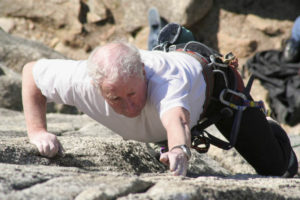
A simple thing can change your life—like tripping on a rug or slipping on a wet floor. If you fall, you could break a bone, like thousands of older men and women do each year. For older people, a break can be the start of more serious problems, such as a trip to the hospital, injury, or even disability.
If you or an older person you know has fallen, you’re not alone. More than one in three people age 65 years or older falls each year. The risk of falling—and fall-related problems—rises with age.
The fear of falling becomes more common as people age, even among those who haven’t fallen. It may lead older people to avoid activities such as walking, shopping, or taking part in social activities.
But don’t let a fear of falling keep you from being active. Overcoming this fear can help you stay active, maintain your physical health, and prevent future falls. Doing things like getting together with friends, gardening, walking, or going to the local senior center helps you stay healthy. The good news is, there are simple ways to prevent most falls.
Many things can cause a fall. Your eyesight, hearing, and reflexes might not be as sharp as they were when you were younger. Diabetes, heart disease, or problems with your thyroid, nerves, feet, or blood vessels can affect your balance. Some medicines can cause you to feel dizzy or sleepy, making you more likely to fall. Other causes include safety hazards in the home or community environment.
Scientists have linked several personal risk factors to falling, including muscle weakness, problems with balance and gait, and blood pressure that drops too much when you get up from lying down or sitting (called postural hypotension). Foot problems that cause pain and unsafe footwear, like backless shoes or high heels, can also increase your risk of falling.
Confusion can sometimes lead to falls. For example, if you wake up in an unfamiliar environment, you might feel unsure of where you are. If you feel confused, wait for your mind to clear or until someone comes to help you before trying to get up and walk around.
Some medications can increase a person’s risk of falling because they cause side effects like dizziness or confusion. The more medications you take, the more likely you are to fall.
If you take care of your overall health, you may be able to lower your chances of falling. Most of the time, falls and accidents don’t “just happen.”
Stay physically active. Plan an exercise program that is right for you. Regular exercise improves muscles and makes you stronger. It also helps keep your joints, tendons, and ligaments flexible. Mild weight-bearing activities, such as walking or climbing stairs, may slow bone loss from osteoporosis.
Have your eyes and hearing tested. Even small changes in sight and hearing may cause you to fall. When you get new eyeglasses or contact lenses, take time to get used to them. Always wear your glasses or contacts when you need them If you have a hearing aid, be sure it fits well and wear it.
Find out about the side effects of any medicine you take. If a drug makes you sleepy or dizzy, tell your doctor or pharmacist.
